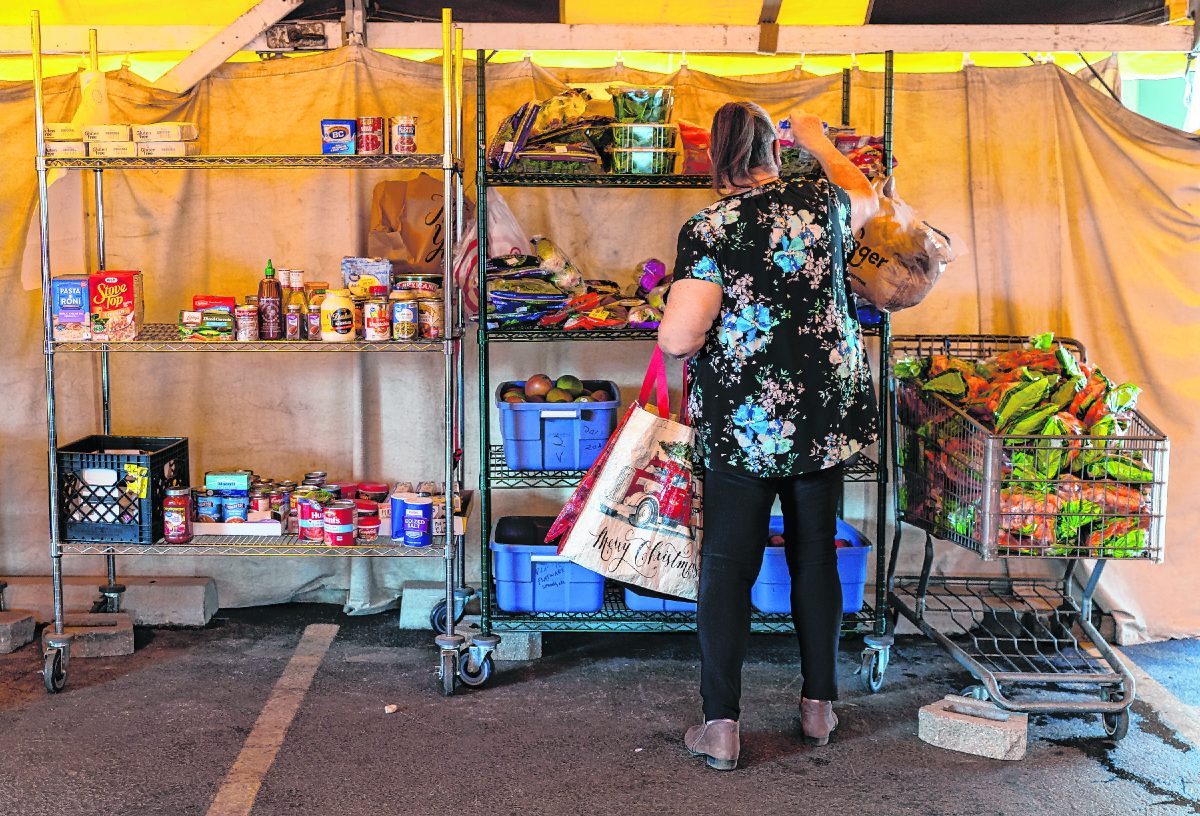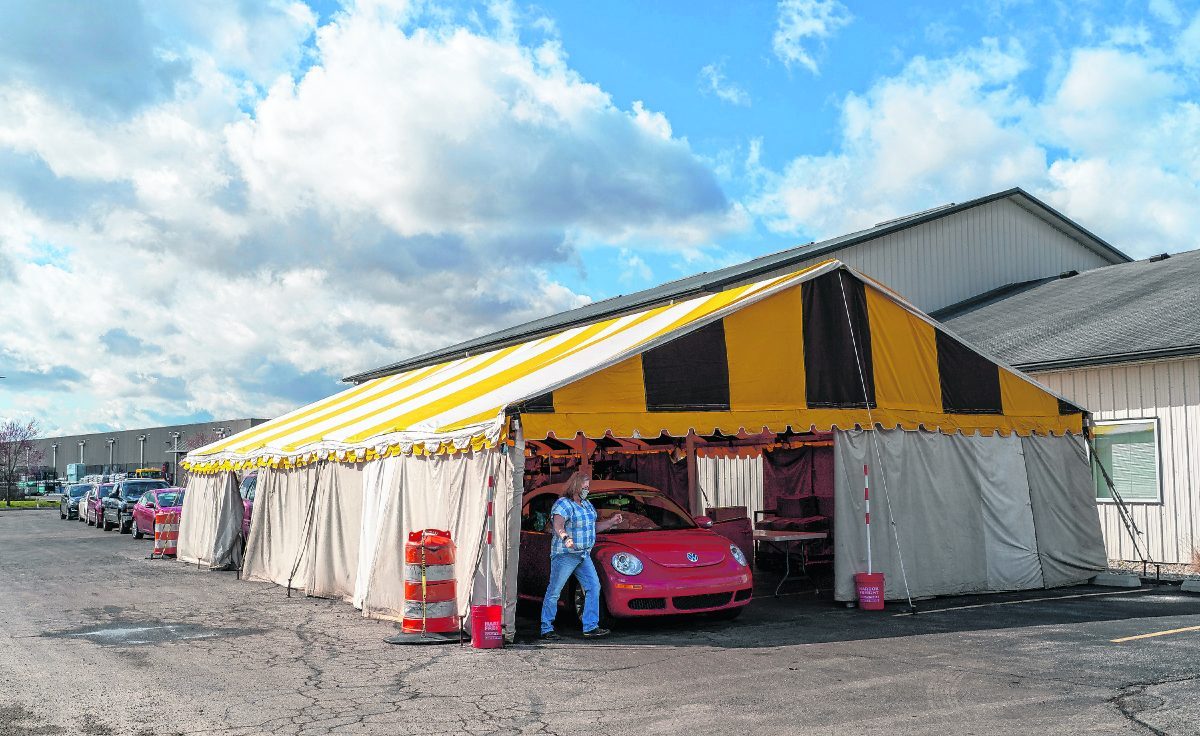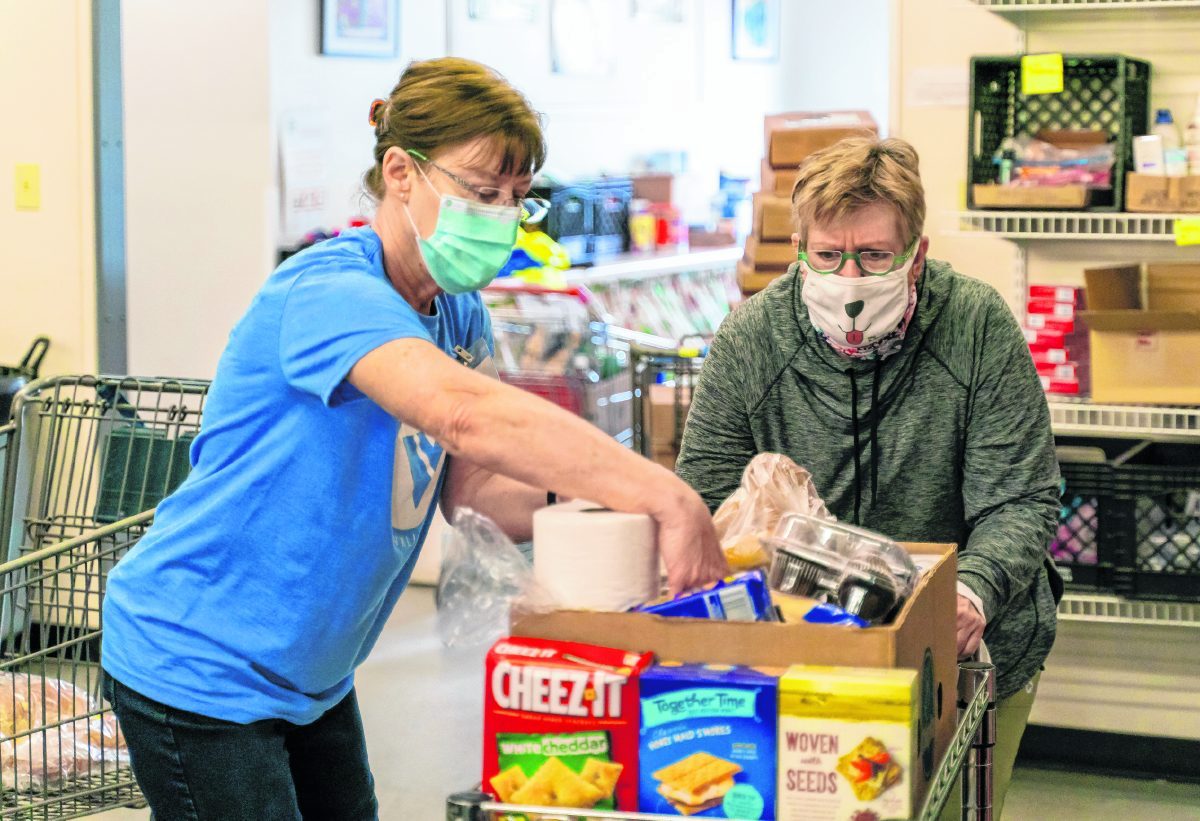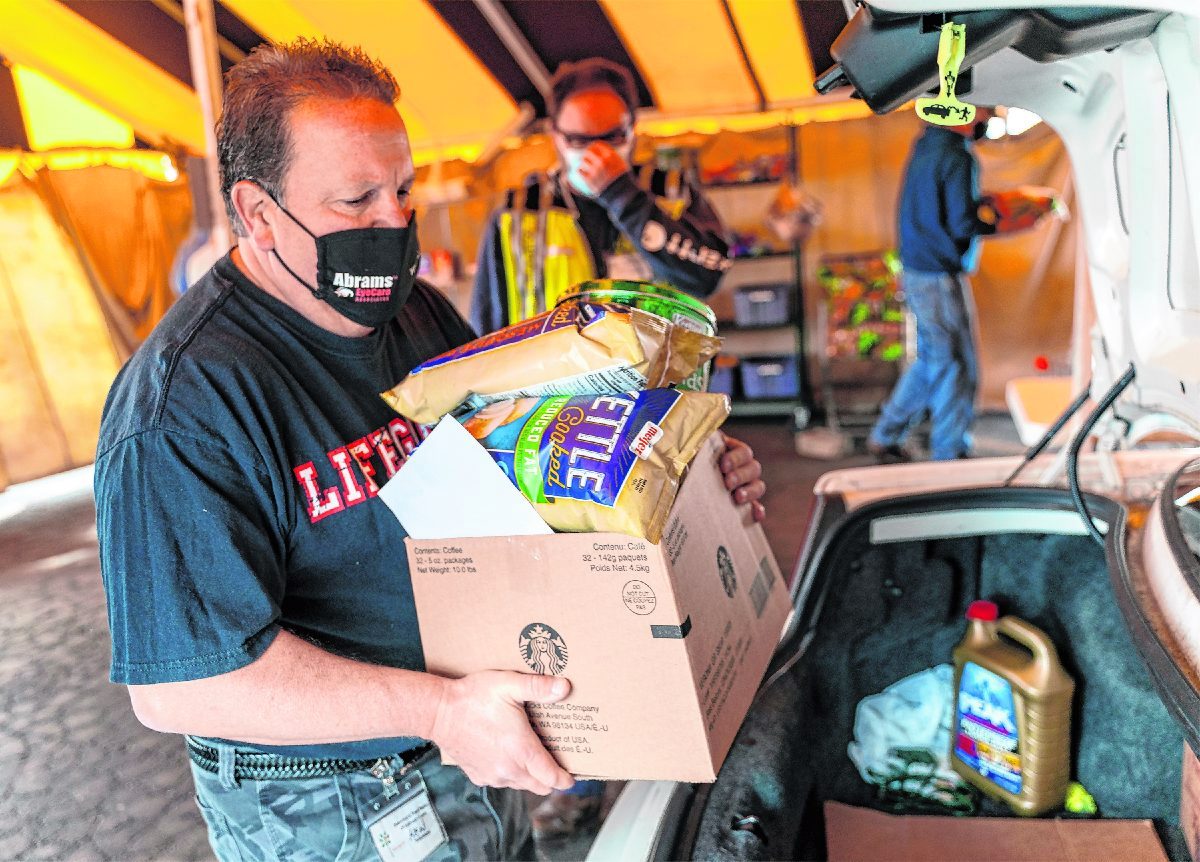
There was one mandate last year at the Interchurch Food Pantry: No one left without help.
Though the pandemic forced the closure of businesses, restaurants and schools, leaders of the pantry understood that was not an option for them. People were desperate for assistance, and more and more families needed food. The pantry had to stay open.
So almost overnight, the longtime Johnson County aid organization rebranded.
“Those early days were challenging. They were filled with worries, because so little was known about COVID at the time,” said Carol Phipps, food pantry manager. “But we had faith that, pulling together, we would make it through. We wanted to be sure that if people came to our door, we turned no one away.”
The Interchurch Food Pantry pivoted to a drive-through pick up under a massive tent, lining up cars and providing a menu to families to give out the food that best fit their situation. The pantry launched a delivery service to serve homebound residents or those who did not feel comfortable leaving.
The result was greater than anyone at the food pantry could have imagined. Over the course of the year, the organization distributed more provisions to 22% more households than in 2019. About 2.2 million pounds of food was provided to more than 25,000 households.
With the help of an enthusiastic army of volunteers, and community support of businesses, churches and individuals, the organization is better prepared than ever to meet the food-related challenges of Johnson County.
“We feel good about continuing in this mode for the foreseeable future, until something changes,” Phipps said.

An everchanging model
Cars started lining up outside the massive white tent more than 40 minutes before the Interchurch Food Pantry started serving people on Wednesday. Masked volunteers prepared the shelves of food for the rush of people that was guaranteed to show up in the three hours the pantry was open.
When those clients arrived at the pantry, they were given an extensive menu to select their food: meats, dairy products, casseroles, bakery items, canned soups, fruits and vegetables, pasta, breakfast food and more. Once they were done, the volunteers would rush through the pantry storehouse, filling the order.
“They get what they want, and it reduces waste,” Phipps said. “Our volunteers feel better about it because they’re getting people the food or extras that they really need and really want.”
As the clients pulled into the drive-through tent, they could shop a large selection of produce such as lettuce, carrots, onions, bananas, apples, potatoes and berries. Those who felt comfortable could leave their vehicles, grab a bag and pick out what they need to feed their families, almost like a farmers market.
The entire process moves people through quickly and efficiently. But when it was first envisioned, it was a far cry from anything the food pantry had ever tried.
Pantry leadership had developed a system that worked seamlessly in a pre-pandemic world. Clients would arrive and check in, then volunteers would help them shop the shelves. More than 100 people — volunteers, clients and their families — could be packed into the pantry at one time.
In the face of the coronavirus pandemic, it was clear that wasn’t going to be an option, Phipps said.
“We were doing everything we could with our old style of operation, with people shopping, trying to have them socially distanced. But it just wasn’t possible,” she said.
Even before lockdowns started throughout the state, Phipps, the board of directors and key volunteers gathered to discuss possible options. They had to remain available to provide food, and they had to do it in the safest way possible.
Someone raised the question of a drive-through model.
“We brainstormed right there on the spot,” Phipps said. “We figured out how to queue up the cars in the parking lot, and how to set up the food so people could choose from an abbreviated menu we had at the time.
“We closed on a Friday, rearranged things over the weekend and started on Monday.”
Quickly, it became clear the new system had its benefits. For the families who came to get food, they didn’t have to get their children out of the car. Individuals who had difficulty walking or moving around could stay seated in their vehicles while their food was brought to them.
Everything seemed to move quicker, Phipps said.
But with that new efficiency, it became clear how much need there was in the community.
As unemployment rose and more people came to the Interchurch Food Pantry for help, officials were concerned about how they would be able to feed everyone in need. Donations had to increase to buy more food. The existing volunteer base — which included a number of older adults who were most at risk from COVID-19 — had to be reworked. Some volunteers stayed home to decrease their chances of exposure, so a new generation of workers were needed to fill their place.

Army of helpers
The food pantry needed help, and the community responded in a big way.
Dozens of new people responded to callouts for volunteers. Students, young parents, adults who had been let go from their jobs or who had flexibility to take time during the day all signed up.
“It was so heartwarming to see the volunteers who did start coming in. There was an outpouring of support,” Phipps said.
Donations poured in as well. The philanthropic group 100+ Women Who Care provided $12,800. Proceeds from the Franklin Rotary Club’s annual Jim Rhoades Memorial Hog Roast went to the food pantry. The Johnson County Community Foundation provided $5,000 through its emergency COVID-19 grant program.
Arbor Homes, Meijer, Johnson County REMC and many other businesses provided funds. Churches such as Greenwood Christian Church and Grace United Methodist Church also stepped up, as did individual donors.
Long’s Furniture World and Long’s Mattress in Franklin offered its box trucks to help pick up additional food.
“The support from the broader community was so reassuring. We had volunteers who couldn’t come in, but would send monetary donations. The community at large was sending food and monetary donations. So many people wanted to help in some way,” Phipps said.
That desire has carried on into the new year. On March 12, the Duke Energy Foundation provided a $5,000 grant. The foundation, which provides more than $30 million in charitable grants each year and makes strategic investments to build powerful communities, had already donated to the Interchurch Food Pantry last year as well.
“We realize that our Duke customers are struggling financially during the pandemic, and the last year really brought to light the issue of food insecurity in our community. It’s not going away,” said Jean Renk, manager of government and community relations for Duke Energy Indiana. “So we want to keep supporting the efforts of these safety-net organizations who continue to serve our communities and customers.”
For pantry leadership, having their help was critical.
“Duke Energy has been a long-time supporter for Interchurch Food Pantry and is committed to making a significant positive impact in our community,” Phipps said. “They believe in fighting hunger and generously provided a grant to enable us to purchase food for our under-resourced community members.”
Phipps is proud of the flexibility and adaptive thinking that helped the food pantry meet the challenges of 2020. Everyone from the board of directors and longtime volunteers to those who gave their time even once during the pandemic played a vital role in that success.
But the large number of people still coming in each day proves that much work remains.
“We’re here for a purpose, and we can make the world a better place,” Phipps said. “That’s what we’re all about here.”
[sc:pullout-title pullout-title=”How to help” ][sc:pullout-text-begin]
Interchurch Food Pantry
What: The need for food has skyrocketed during the pandemic with daily households served increasing by 50%. To address that need, they need volunteers, in addition to monetary donations and canned and box foods, as well as hygiene products
How to get involved:
Volunteers: Volunteers are needed 10 a.m.-3 p.m. Monday through Friday. Email [email protected] to get started volunteering. Coronavirus-related procedures require 100% masks at all times, only healthy workers, social distancing and temperatures are taken before each shift.
Monetary donations: Can be mailed to Interchurch Food Pantry, P.O. Box 147, Whiteland, IN 46184 or via Paypal or Givelify on the organization’s website www.jcpantry.org.
Food donations: Can be dropped off between 10 a.m.-3 p.m. Monday-Friday at 211 Commerce Drive. Drive up to the marked Donation Door beyond the tent by the overhead door. Or, drop it in the after-hours donation shed by the donation door.
[sc:pullout-text-end]





